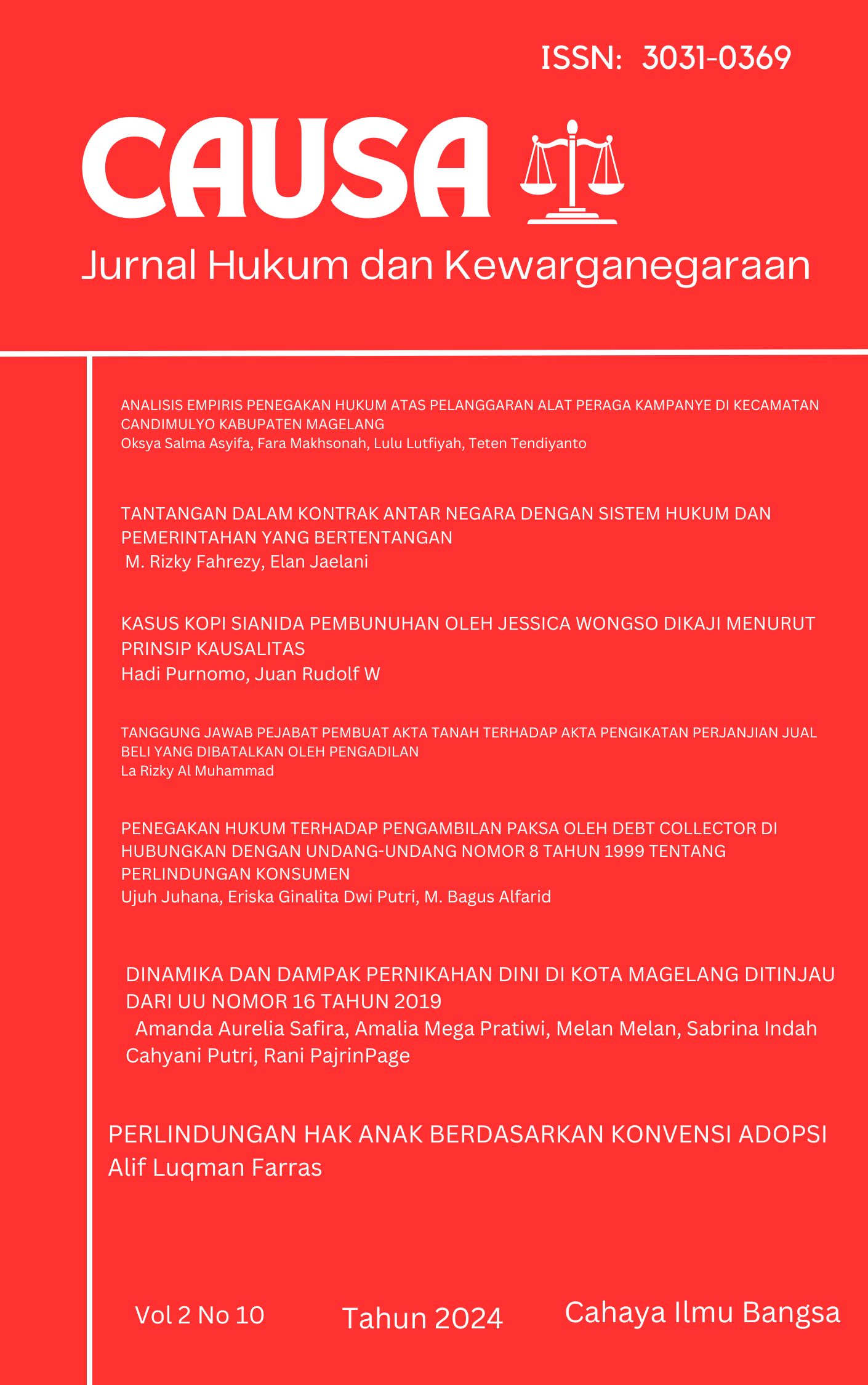TINDAK PIDANA PENCUCIAN UANG DALAM PERSPEKTIF HUKUM POSITIF DAN ISLAM: ANALISIS TEORETIS DAN STUDI KASUS DI INDONESIA
- Authors
-
-
Aditya Gilang Rifai
Manajemen, Fakultas Ekonomi, UIN Maulana Malik Ibrahim MalangAuthor -
Romi Faslah
Manajemen, Fakultas Ekonomi, UIN Maulana Malik Ibrahim MalangAuthor
-
- Keywords:
- Money Laundering, Anti-Money Laundering Law, Islamic Law, PPATK, Sharia Financial System
- Abstract
-
Money laundering is a transnational crime that poses a significant threat to economic stability, the integrity of financial systems, and the rule of law in a country. This study aims to analyze the effectiveness of Indonesia’s positive legal framework in combating money laundering, examine relevant case studies, and explore the Islamic legal perspective on such practices. Using a normative juridical and qualitative-descriptive approach, this research analyzes Law No. 8 of 2010 along with scholarly literature and Islamic fatwas. The findings indicate that despite the establishment of regulations and institutions like the Financial Transaction Reports and Analysis Center (PPATK), law enforcement faces technical, technological, and inter-agency coordination challenges. Meanwhile, Islamic law, based on the principles of maqashid sharia, emphasizes justice, transparency, and the prohibition of unlawfully acquired wealth. Integrating positive law and sharia-based frameworks offers an alternative strategy to strengthen anti-money laundering efforts in Indonesia.
- Downloads
- Published
- 2025-06-21
- Section
- Articles
How to Cite
Most read articles by the same author(s)
- Ainul Lutfiyah, Romi Faslah, STANDARISASI HALAL SEBAGAI KEUNGGULAN KOMPETITIF INDUSTRI HALAL GLOBAL , Causa: Jurnal Hukum dan Kewarganegaraan: Vol. 13 No. 7 (2025): Causa: Jurnal Hukum dan Kewarganegaraan
- Dina Angelina, Romi Faslah, TANTANGAN DAN PROSPEK STANDARISASI HALAL INDONESIA DI ERA GLOBALISASI , Causa: Jurnal Hukum dan Kewarganegaraan: Vol. 13 No. 7 (2025): Causa: Jurnal Hukum dan Kewarganegaraan
Similar Articles
- Nabila Afifah, Mutiara Deja Saputri, Nabila Zahra Okta Dwiwani, Iskandar Iskandar, Sonia Ivana Barus, PERBANDINGAN KEDUDUKAN DAN KEKUATAN HUKUM SANKSI DISIPLIN ASN DALAM SISTEM KEPEGAWAIAN NASIONAL PASCA UU NO. 20 TAHUN 2023 , Causa: Jurnal Hukum dan Kewarganegaraan: Vol. 13 No. 1 (2025): Causa: Jurnal Hukum dan Kewarganegaraan
- Muh Rafli Akbar, Radini, KEPASTIAN HUKUM TERHADAP PEMBENTUKAN RUMAH TAHANAN ANAK DITINJAU BERDASARKAN UNDANG-UNDANG NOMOR 11 TAHUN 2012 TENTANG SISTEM PERADILAN PIDANA ANAK , Causa: Jurnal Hukum dan Kewarganegaraan: Vol. 14 No. 5 (2025): Causa: Jurnal Hukum dan Kewarganegaraan
- Astu Asmawati, Dian Eka Prastiwi, Chika Antonia, Chanda Alfira, TINJAUAN YURIDIS TERHADAP EFEKTIVITAS SANKSI ADMINISTRATIF DALAM PENEGAKAN HUKUM PAJAK DI INDONESIA , Causa: Jurnal Hukum dan Kewarganegaraan: Vol. 13 No. 4 (2025): Causa: Jurnal Hukum dan Kewarganegaraan
- Salsabila Aprilia, Baidhowi Baidhowi, ANALISIS PRINSIP-PRINSIP HUKUM EKONOMI SYARIAH DALAM PENGELOLAAN ZAKAT DAN WAKAF SEBAGAI INSTRUMRN PEMBERDAYAAN EKONOMI UMAT , Causa: Jurnal Hukum dan Kewarganegaraan: Vol. 13 No. 9 (2025): Causa: Jurnal Hukum dan Kewarganegaraan
- Fhadhilatul Fhatihah, Nadila Nuraini, Lunneta Ardelia Isywal, EFEKTIVITAS PENEGAKAN HUKUM TERHADAP TINDAK PIDANA JUDI OLNLINE DALAM PERSPEKTIF UU ITE DAN KUHP , Causa: Jurnal Hukum dan Kewarganegaraan: Vol. 13 No. 5 (2025): Causa: Jurnal Hukum dan Kewarganegaraan
- Khalisa Noer Afina, Sesilya Karisma Dewi Ayu Hermawan, URGENSI PENEGAKAN HUKUM YANG BERKEADILAN DALAM KONTEKS REFORMASI INDONESIA , Causa: Jurnal Hukum dan Kewarganegaraan: Vol. 14 No. 10 (2025): Causa: Jurnal Hukum dan Kewarganegaraan
- Najwa Melfia Maharani, Emilia Susanti, Deni Achmad, Firganefi, POLITIK HUKUM PIDANA DALAM PENANGGULANGAN TINDAK PIDANA PEMERASAN BERMUATAN SEKSUAL (SEXTORTION) MELALUI MEDIA SOSIAL , Causa: Jurnal Hukum dan Kewarganegaraan: Vol. 15 No. 8 (2025): Causa: Jurnal Hukum dan Kewarganegaraan
- Fikri Haikal, Henny Nuraeny, J. Jopie Gilalo, KEBIJAKAN HUKUM TERHADAP ANAK PENGGUNA NARKOTIKA DIKAJI DALAM UNDANG-UNDANG NO. 35 TAHUN 2009 TENTANG PEMBERANTASAN TINDAK PIDANA NARKOTIKA (STUDI KASUS DI WILAYAH POLRESTA BOGOR KOTA) , Causa: Jurnal Hukum dan Kewarganegaraan: Vol. 15 No. 2 (2025): Causa: Jurnal Hukum dan Kewarganegaraan
- Dzauraz Zidnan R, Fajar Agus H, Muhammad Afif F, Eksanudin, Tegar Harbriyana P, PENEGAKAN HUKUM TERHADAP TINDAK PIDANA TERORISME DALAM PERSPEKTIF HAK ASASI MANUSIA DI INDONESIA , Causa: Jurnal Hukum dan Kewarganegaraan: Vol. 14 No. 2 (2025): Causa: Jurnal Hukum dan Kewarganegaraan
- Muhammad Imron, Dr.Junifer Dame Panjaitan S.H.,M.H, PEMULIHAN KORBAN TINDAK PIDANA PERDAGANGAN ORANG DALAM SISTEM PERADILAN INDONESIA , Causa: Jurnal Hukum dan Kewarganegaraan: Vol. 15 No. 7 (2025): Causa: Jurnal Hukum dan Kewarganegaraan
You may also start an advanced similarity search for this article.

